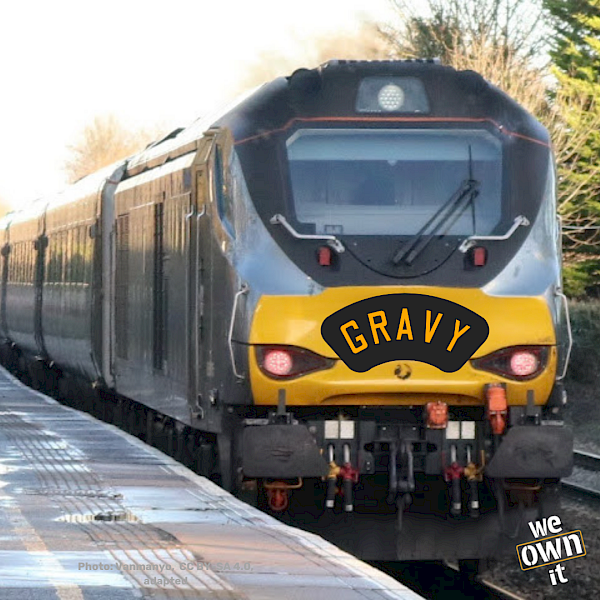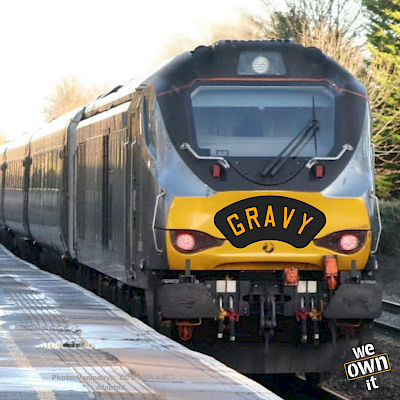
15 Oct 2024
You may not have heard of UK’s private train-leasing firms, the ROSCOs (ROlling Stock COmpanies), but if you’ve travelled by train in the last 30 years you’ll have made their acquaintance. Maybe, like Money Saving Expert Martin Lewis described last February, you’ve stood up for the whole of a long journey, cheek by jowl with your fellow travellers, on an over-full train with only one working toilet. Or a train advertised as having 10 carriages turns up with half that number. Does that sound familiar?
Three ROSCOs were gifted a trading monopoly out of the privatisation and carving up of British Rail in 1994. Today those ROSCOs own most of the 15,200 vehicles that are registered to run on Britain’s railways, and they make their money by leasing those locomotives, freight wagons, and carriages to the train operating companies. In 2023 the profits of the ROSCOs tripled from £122.3m to £409.7m. Every time you buy a ticket to travel, a proportion of the cost goes on paying the rent being charged by the ROSCOs to the train lines.
The three private ROSCOs are Angel Trains, Eversholt, and Porterbrook. And while our train services have endured austerity cuts, rail worker salaries are frozen, and we suffer regular fare increases (including the latest one this month), their Fat Cat Controllers have been riding the gravy train and creaming off huge profits subsidised by YOU - the taxpayer.
Taken together, the three ROSCOs have seen their net profit margins treble in a year from 14.3% to 41.6%, and they paid dividends of £409.7m in 2022-23, up from £122.3m in the previous year. They have paid cumulative dividends of around £2bn in the last decade and the highest-paid directors earn almost twice as much as the chief executive of Network Rail. Across our entire rail network, ROSCOs are where the real money goes.
In common with so many other of our privatised industries, this money travels straight into the pockets of overseas investors:
- Angel Trains is 64% owned by Canadian pension fund the Public Sector Pension Investment Board (PSP), with 10% owned by Arjun Infrastructure Partners, a London-based asset management firm. In 2022 Angel Trains paid dividends of £124.6m, and Malcolm Brown, its chief executive, was paid £900k.
- Eversholt is a subsidiary of the CK Group. Their portfolio of UK companies also includes Northumbrian Water and UK Power Networks, which delivers electricity to London and the East and South East of England. According to its latest accounts Eversholt paid dividends of £40.7m in 2022, while its chief executive Mary Kenny was paid just over £1m.
- Porterbrook is 30% owned by AIMCO, a Canadian pension fund; 30% by Allianz, a German insurance firm; 30% by asset management firms in Israel and the UK; and 10% by EDF which is owned by the French state. Porterbrook paid dividends of £80m in 2022 and paid Mary Grant, its chief executive, £1.2m.
So what does this mean for you, the hapless train traveller? The effect of the ROSCO monopoly, combined with a leasing model which discourages the companies from investing in their assets, means that the supply line of new rolling stock is choked and the average age of the existing stock has increased (16 years in the last year before privatisation to almost 20 years in 2017/18). Profits which over the years could have gone into building up to 1,000 new vehicles have instead been syphoned off to keep investors satisfied.
On top of that, the nature of the contracts between government and the train operating companies means that any shortfall between their revenue and their costs has to be met out of the public purse. This means we’re subsidising the rental cost of the rolling stock - almost a quarter of train companies’ operating costs.
No wonder that Mick Lynch, general secretary of the RMT union, says “there is a racket going on, where the structure of rolling stock leasing has just created massive dividends and massive profits entirely without risk.” Their complex financial arrangements are also very hard to untangle; which is possibly why Labour have not given the same commitment to bring ROSCOs in-house that they have for the train operating companies.
So remember, when you’re on the only train home, crammed together like sardines in a tin and clambering over scores of other commuters to get to your seat or the loo, that for the ROSCOs the gravy train keeps on rolling.
You can sign our petition to bring the railways into public hands HERE.
John Kay, Communications and Campaigns Support at We Own It.
John joined the WOI team in June 2023. Before that he worked in the Communications team at Oxford University Press. At 6’5” tall, he doesn’t like standing up in trains.


Comments
Jenifer Devlin 2 years ago
The neoliberal model so beloved by Tories is sucking our country dry and destroying the whole of our public realm. It has to go.
Reply
Kevin Bain 2 years ago
Cooperates continue to fleece the public while filling shareholder pockets.Coperate robbery allowed by Westminster as most have affiliation with the Cooperates!!
Reply
Jen Williams 1 year ago
Coops are usually okay.
It's the corporates that are the problem.
Reply
Anthony Johnstone 2 years ago
A shocking scam on the public purse. Heads they win tails we lose.
Reply
Peter Walters 2 years ago
Question if I may.The renting of passenger carriages,does that include Wales?
My reason for asking.I have a number of issues with Transport for Wales one of them includes the lack of toilets at refurbished stations and the newest passenger carriages not having toilets.
Regards Peter Walters BEM
Reply
Kate 2 years ago
Hi Peter.
Yes it does.
Reply
Anonymous 2 years ago
Absolute disgrace. Next drama? Essential to bring back into public ownership and freeze assets of these companies, executives and use to repay the UK taxpayers. Those that do not use offshore tax efficient ( read avoidance) loopholes.
Reply
Jean GOWER 2 years ago
Stop the greed
Reply
RJ Seddon 2 years ago
Managed decline. Or enshittification. Unfortunately Labour look disinclined to veer from austerity.
Reply
Michael Denholm 1 year ago
Shysters & Spivs 'trousering' cash from an industry we (the British public) once owned. John Major should hang his head in shame.
Reply